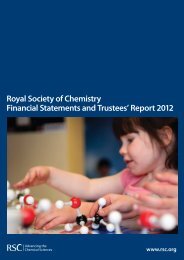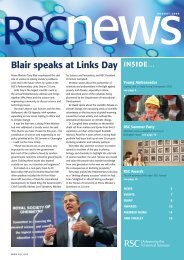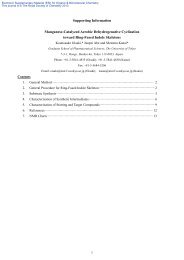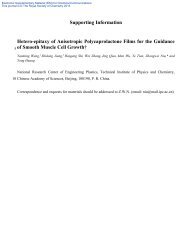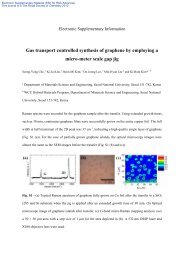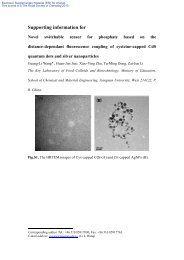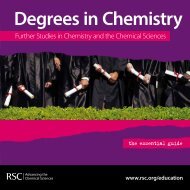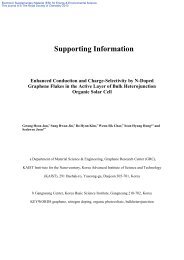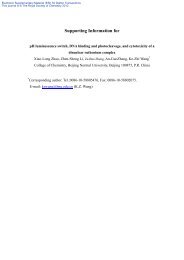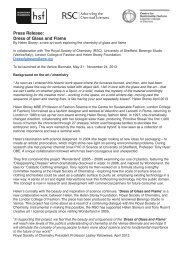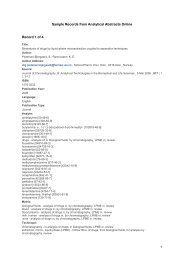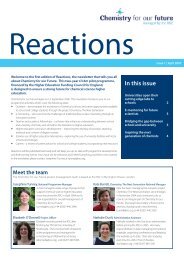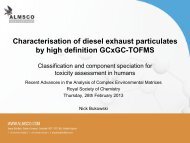Space: Exploration and exploitation in a modern society
Space: Exploration and exploitation in a modern society
Space: Exploration and exploitation in a modern society
Create successful ePaper yourself
Turn your PDF publications into a flip-book with our unique Google optimized e-Paper software.
<strong>Space</strong>: <strong>Exploration</strong> <strong>and</strong> <strong>exploitation</strong> <strong>in</strong> a <strong>modern</strong> <strong>society</strong><br />
Introduction<br />
The Institute of Physics, the Royal Society of Chemistry <strong>and</strong> the Parliamentary <strong>Space</strong> Committee<br />
held a jo<strong>in</strong>t sem<strong>in</strong>ar at the House of Commons on 20 May 2009. The sem<strong>in</strong>ar highlighted how space<br />
exploration is lead<strong>in</strong>g to major scientific discoveries, is essential to the UK economy <strong>and</strong> how it helps<br />
to improve our everyday lives while play<strong>in</strong>g a crucial role <strong>in</strong> manag<strong>in</strong>g global challenges such as<br />
climate change.<br />
Curiosity about the Earth, the planets <strong>and</strong> stars has been the driv<strong>in</strong>g force beh<strong>in</strong>d human progress<br />
s<strong>in</strong>ce prehistoric times. Today, the exploration of the universe beyond the conf<strong>in</strong>es of our home<br />
planet rema<strong>in</strong>s one of the most <strong>in</strong>spir<strong>in</strong>g, excit<strong>in</strong>g <strong>and</strong> fruitful areas of scientific research. Many<br />
studies require send<strong>in</strong>g spacecraft <strong>in</strong>to space, mostly unmanned, although humans first reached the<br />
Moon 40 years ago <strong>and</strong> may go to Mars <strong>in</strong> the future. One of the ma<strong>in</strong> advantages of <strong>in</strong>vestigat<strong>in</strong>g<br />
the universe from space is that the details of far-off galaxies, as well as events mark<strong>in</strong>g the birth,<br />
evolution <strong>and</strong> death of stars, can be seen unhampered by the blurr<strong>in</strong>g effects of the atmosphere, <strong>and</strong><br />
at wavelengths of light not easily accessible from the ground. Increas<strong>in</strong>gly, scientists <strong>and</strong> eng<strong>in</strong>eers<br />
are develop<strong>in</strong>g advanced space probes, with robotic components that can operate autonomously, to<br />
explore the extraord<strong>in</strong>arily diverse planets <strong>and</strong> moons of our solar system.<br />
As well as gaz<strong>in</strong>g at the cosmos, many space missions are designed to look back at the Earth, to study<br />
its rich complexity <strong>and</strong> the effects of humans on the terrestrial environment. Satellite services is one<br />
of the fastest-grow<strong>in</strong>g areas of advanced technology. It is now hard to imag<strong>in</strong>e <strong>modern</strong> life without<br />
satellite communications – for enterta<strong>in</strong>ment, <strong>in</strong>formation, security <strong>and</strong> environmental monitor<strong>in</strong>g.<br />
Basic science, Earth observation <strong>and</strong> the application of technology <strong>in</strong> everyday life cont<strong>in</strong>ue to benefit<br />
hugely from space exploration. As governments <strong>and</strong> space agencies plan ever more technically<br />
challeng<strong>in</strong>g missions to survey the universe, go<strong>in</strong>g back to its birth, <strong>and</strong> even to search for signs of life<br />
on planets around other stars, the result<strong>in</strong>g technologies developed will f<strong>in</strong>d use on Earth, <strong>in</strong> sectors as<br />
diverse as health <strong>and</strong> transport. One day we may even be able to utilise the natural resources, such as<br />
water <strong>and</strong> fuels, that are found on other solar-system bodies, as our own supplies dw<strong>in</strong>dle.<br />
Mr Ian Taylor MP, co-chairman of the Parliamentary <strong>Space</strong> Committee <strong>and</strong> a former m<strong>in</strong>ister for<br />
science <strong>and</strong> technology, chaired the sem<strong>in</strong>ar. He emphasised that space projects <strong>in</strong>spire everyone<br />
<strong>and</strong> draw young people <strong>in</strong>to study<strong>in</strong>g science. He po<strong>in</strong>ted out that satellite services are play<strong>in</strong>g an<br />
<strong>in</strong>creas<strong>in</strong>gly important part <strong>in</strong> monitor<strong>in</strong>g l<strong>and</strong> use, transport services <strong>and</strong> the impact of environmental<br />
disasters. Prof. David Southwood, director of science <strong>and</strong> robotic exploration at the European <strong>Space</strong><br />
Agency (ESA), expla<strong>in</strong>ed how current <strong>and</strong> future space-science missions will cont<strong>in</strong>ue to transform our<br />
underst<strong>and</strong><strong>in</strong>g of basic physics <strong>and</strong> the universe, as well as the Earth itself. Mr David Williams, chief<br />
executive of the satellite-communications company Avanti Communications, described how space<br />
science <strong>and</strong> technology are generat<strong>in</strong>g flourish<strong>in</strong>g <strong>and</strong> exp<strong>and</strong><strong>in</strong>g space-based <strong>in</strong>dustries <strong>and</strong> services<br />
<strong>in</strong> the UK. Dr Maggie Ader<strong>in</strong>-Pocock, optical <strong>in</strong>strumentation group leader of the European aerospace<br />
company Astrium <strong>and</strong> STFC-funded fellow of University College London, gave examples of how recent<br />
space missions are impact<strong>in</strong>g on our lives <strong>and</strong> exp<strong>and</strong><strong>in</strong>g our perception of our place <strong>in</strong> the universe.<br />
The UK has a major space programme, which it pursues through membership of ESA <strong>and</strong> some bilateral<br />
collaborations outside Europe. Eighteen European countries participate <strong>in</strong> ESA, <strong>and</strong> the number is<br />
likely to grow with <strong>in</strong>creas<strong>in</strong>g <strong>in</strong>terest from eastern Europe. ESA’s remit covers the exploration of<br />
the universe, Earth observation, <strong>and</strong> the development of underp<strong>in</strong>n<strong>in</strong>g technology for commercial<br />
satellite operations <strong>and</strong> other applications. Although ESA’s budget is smaller than that of NASA, its<br />
programmes are highly productive, both <strong>in</strong> terms of the scientific discoveries <strong>and</strong> economic benefits<br />
derived from novel technologies developed to carry them out.<br />
S p a c e : Ex p l o r a t i o n a n d e x p l o i t a t i o n <strong>in</strong> a m o d e r n s o c i e t y August 2 0 0 9<br />
1



